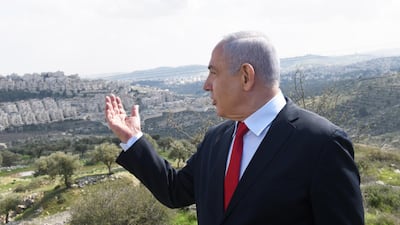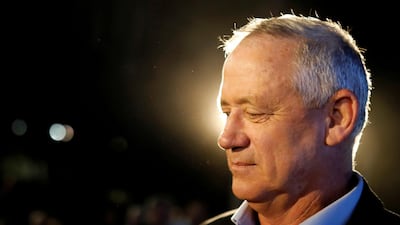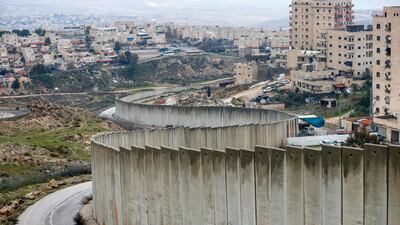Israelis on Monday head to the polls for the third time in 12 months with Prime Minister Benjamin Netanyahu seeking re-election under the weight of an imminent corruption trial.
The bruising electoral battles last year dimmed the aura of political invincibility enjoyed by Israel's longest-serving prime minister, who has denied any wrongdoing in the three graft cases against him.
Like the inconclusive votes last April and September, opinion polls show neither Mr Netanyahu's right-wing Likud nor the centrist Blue and White party of his main challenger, former armed forces chief Benny Gantz, will securing enough votes on their own or with coalition allies, for a governing majority in parliament.
Such a result sets the country up for a fourth election before the end of 2020.
Polls opened at 7 am and Israelis have until 10 pm to cast their vote, at which point media outlets can publish the first exit polls and signal whether the deadlock was broken. More stalemate could push Israel, where a 2020 budget is still pending, further into economic limbo.
Turnout figures will be watched closely, particularly given the concern over the global coronavirus outbreak and accusations of malicious rumours about contamination in areas seen as strongholds for particular parties. Political apathy over the stalemate could also keep people from voting.
People under home-quarantine, such as those who have recently travelled back to Israel from coronavirus hot spots, can attend special polling stations if they wear surgical masks and show no sign of the disease.
Israel's economy has weathered the political turmoil, with growth strong and the labour market tight. But the longer the stalemate continues, the heavier the toll, including the lack of new money for health, education, welfare or infrastructure projects until an annual budget is approved by parliament.
Mr Netanyahu's battle to win an unprecedented fifth term has become more complicated since the previous election, having been indicted on charges of bribery, breach of trust and fraud over allegations he granted state favours worth hundreds of millions of dollars to Israeli media barons in return for gifts and favourable coverage.
Mr Netanyahu is due to go on trial on March 17, when post-election coalition wheeling and dealing is likely to be in full swing.
Playing the character card against Mr Netanyahu, Mr Gantz has dubbed his rival "the defendant" and alleged that he sought to retain power to promote legislation that would bar authorities from putting a sitting prime minister on trial.
Mr Netanyahu has portrayed Mr Gantz, 60, as a "coward" incapable of confronting the many dangers Israel faces in the region and has suggested that he is hiding secrets that would open him to blackmail by Iran.
Each man says the other is lying and unfit to serve.
Drawing accusations of racism during one of Israel's most contentious campaigns, Mr Netanyahu has played on many Israelis' suspicions about the loyalty of the country's Arab minority, which makes up 21 per cent of the population.
Mr Gantz, Mr Netanyahu said, would seek Arab politicians' support in parliament to form a government and they would tie his hands in any military action in the region.
While Arab parties are unlikely to enter office in a coalition, Palestinian and Arab Israeli politicians are hoping to use the sudden vulnerability of Mr Netanyahu to energise a base that rarely votes in large numbers in a collective bid to help de-throne the prime minister.
In the first heat last April, Arab parties did not run a unified list with Ta’al getting 6 seats in coalition with the left-wing Israel Hadash while the Unified Arab List got 4 seats in the Knesset. In September’s poll, the Arab parties again ran a unified list and took 13 seats – making them the third-largest party in the parliament.
In Monday’s race, the Arab parties are again running on a joint list and hope to secure more than 13 seats.
Mr Netanyahu hopes a peace plan that US President Donald Trump presented in January will give him a boost at the polls, saying its recognition of Israeli sovereignty over settlements in the occupied West Bank will enable him to annex them within weeks of the election.
Palestinians have rejected the US blueprint as leaving them with only "Swiss cheese" wedges of territory for a state they seek to create in the West Bank and Gaza Strip.




















